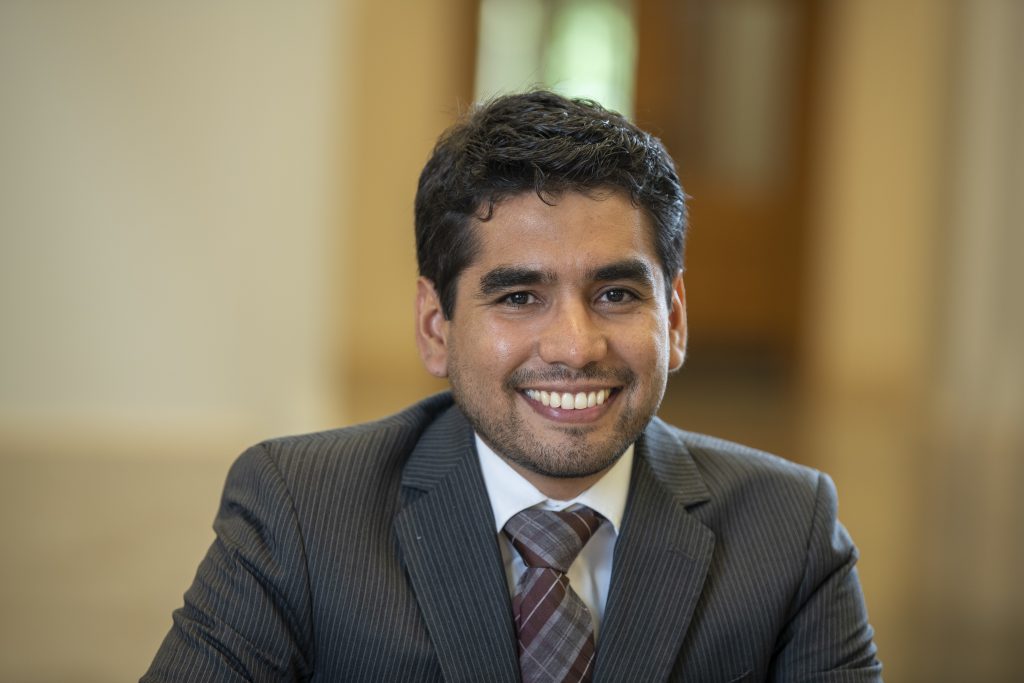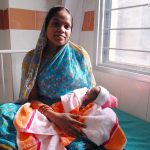Hugo Flores Navarro has been aware of inequality since he was very young. As a child growing up in Mexico he rode a bus from Tecali, his hometown of 5,000, to Puebla, the country’s fourth-largest city, where he attended an upper-middle class private school.
“I was seeing two worlds on a daily basis,” said Flores, now a physician and first-year master of global affairs student at the Keough School. “The reality of the kids I went to school with was very different from the reality of the kids I played with in the afternoon. I questioned why the rich kids got fancy toys at Christmas and the kids in my hometown played with marbles in the dirt. I eventually realized there was no moral logic behind it.”
Raised by parents who owned a masonry business but received no formal education beyond elementary school, Flores remembers conversations with his mother about the inequality he was seeing.
“She would talk about how the world shouldn’t be like that,” he said. “She was very involved in the Catholic Church and was also politically concerned about poverty.”
Flores first considered becoming a doctor at age 14. He enrolled in medical school at 18, as is common practice in Mexico, then briefly dropped out to join a protest movement opposing a planned industrial waste complex outside Tecali. After graduating from Tec de Monterrey Medical School, Flores completed his social service year—a requirement for all new physicians—and moved from Monterrey to Chiapas, the poorest state in the country.
I began to see health as a human right, and I wanted to be part of a movement that would promote that.
Working for a local community health group sponsored by Partners in Health, Flores familiarized himself with the region and its challenges, which included remote, disparate communities that were not easily accessed because of mountainous terrain. He saw clinics that were open but not operational because there was no one to staff them. He saw patient after patient with complications from common diseases that had been untreated for years: hypertension, diabetes, tuberculosis, skin cancers, and epilepsy. When he read Pathologies of Power, a memoir by physician and Partners in Health founder Paul Farmer, his perspective on health care started to shift.
“I began to see medicine in a political way,” Flores said. “I realized that the quality of health care depends on the purchasing power of the patient, and a lot of people don’t question that. I began to see health as a human right, and I wanted to be part of a movement that would promote that.”
Flores reached out to the chief medical officer of Partners in Health in Boston, eventually getting approval in 2010 to create a Mexican sister organization, Compañeros En Salud (CES) in the Sierra region of Chiapas. By 2012, the CES team was collaborating with the Mexican Ministry of Health and Tec de Monterrey, and previously unused clinics were now staffed by new physicians fulfilling the country’s social service requirement. The number of clinics then expanded from two to six in six months, then 10. Eventually the program attracted still more doctors, then medical students and health volunteers of all kinds. Seven years later, the program still faces challenges—financial dependence on donors, no cell phone service, limited Internet access, uneven terrain requiring four-by-four vehicles—but it is thriving. Most CES staff members are health care professionals who completed their social service year and opted to stay.
“We made it desirable to stay in this region,” Flores said. “If we can set up a full health system in this remote place, it can be done anywhere.”
Flores visited Notre Dame for the first time in 2013 when he attended a conference on accompaniment—a concept in international development based on lasting partnership—hosted by the Kellogg Institute for International Studies. He learned about the master of global affairs program from Steve Reifenberg, Keough School associate professor of the practice of international development, who serves on the Partners in Health Board of Trustees.
“Hugo brings the experience of managing hundreds of people over time, working in life-and-death circumstances,” Reifenberg said. “He has the ability to step out of sector-specific and country-specific settings and into the international context of complex global problems.”
Four months into the master of global affairs program, Flores said he appreciates the opportunity to address global problems from the perspective of disciplines such as philosophy or theology.
“Having a community of faculty and students that offer an academic and spiritual perspective is unique. I believe many of the problems in the world have a spiritual element or root.”
While he’s not yet sure what life after Notre Dame will bring, Flores knows he will continue to devote his professional life to promoting health as a human right.
“We cannot accept different standards of healthcare for different human beings,” he said. “We need to fight until this concept becomes history.”



